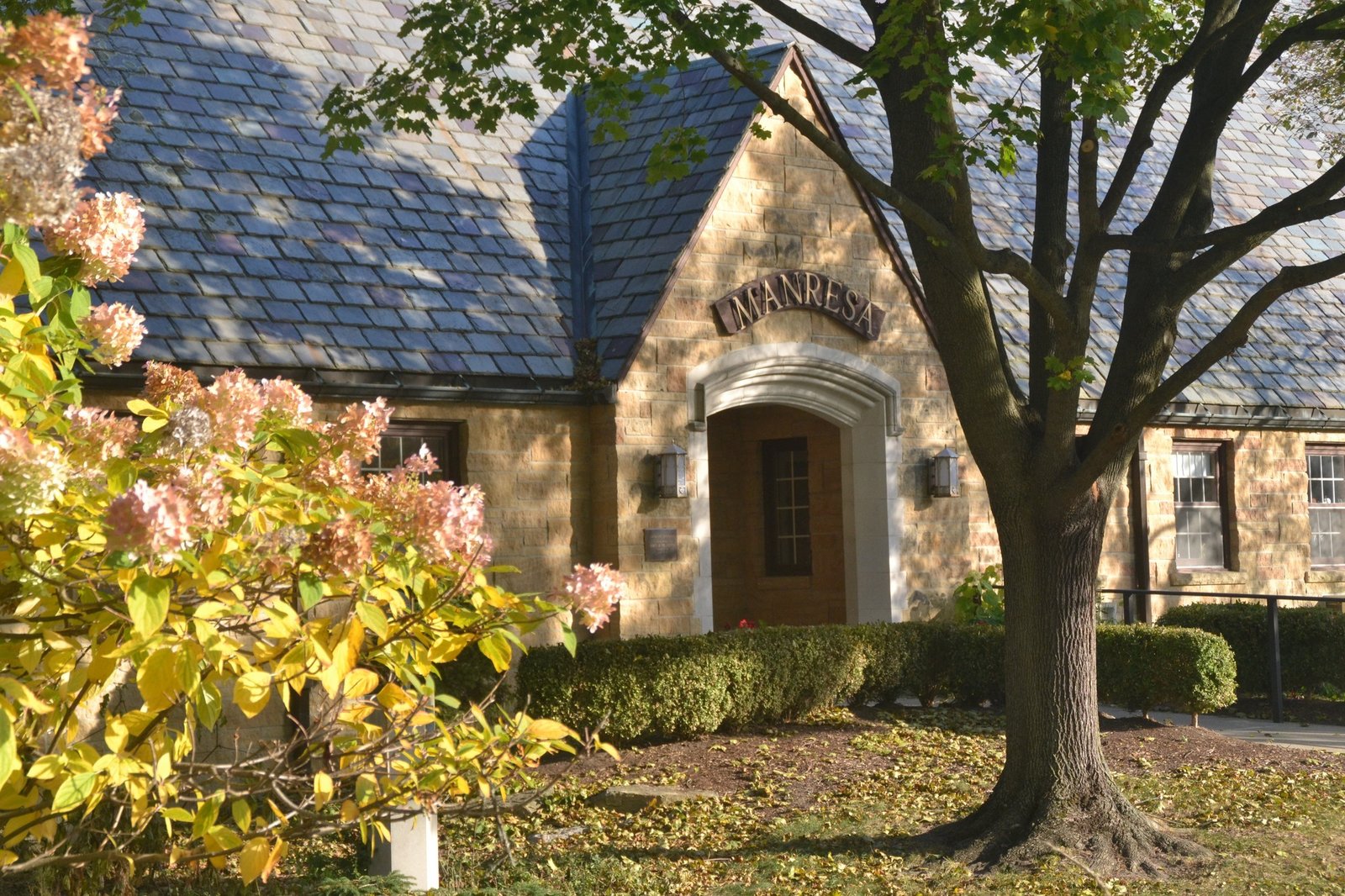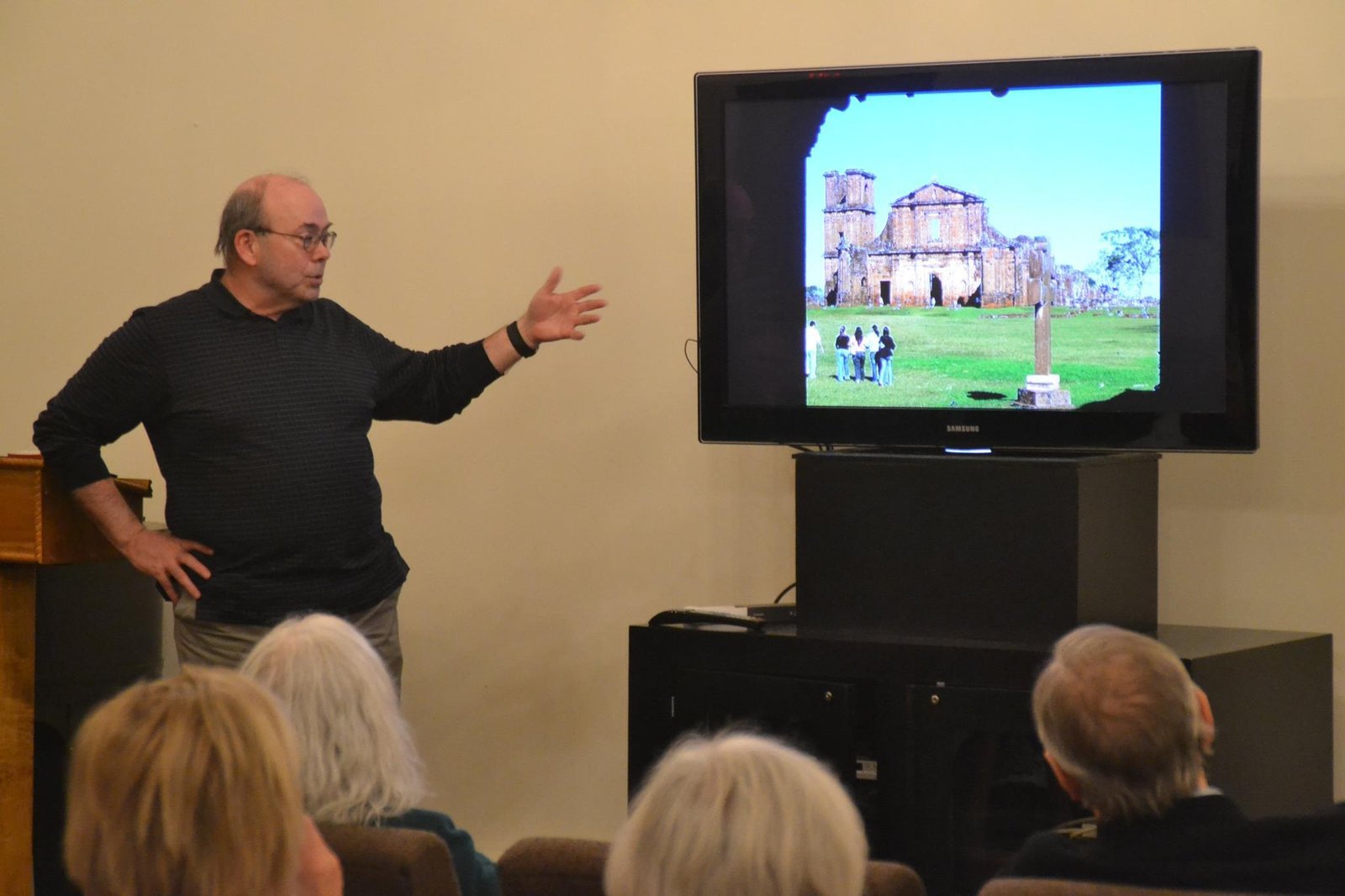Fr. Steve Hurd, SJ, talks about giving retreats at Manresa, and how 'happiness' goes a long way toward evangelization
BLOOMFIELD HILLS — After Mass on a dark morning in the main chapel of Manresa Jesuit Retreat House in Bloomfield Hills, Fr. Steve Hurd, SJ, led a reporter through the halls of the two-story stone structure built in 1936. A stop in the cafeteria for a cup of coffee produced humorous banter with the kitchen staff before Fr. Hurd settled down behind his desk in his spare office to talk.
“I’m an East Tennessean, grew up in Kingsport," Fr. Hurd began. "My parents both worked for a company called the Kingsport Press. It was the world’s largest maker of books at the time. My dad was in management at the plant and my mom was a book designer.”
Don't miss another story
Did you know you can get Detroit Catholic's latest daily or weekly articles delivered to your inbox? It's easy and free to sign up.
His parents were not devout Catholics, as one might expect from a son who became a Jesuit and the co-director of the internship in spiritual companionship at Manresa.
“My dad was not Catholic, but my mom was. She was a convert, and I think my mom had the devotion that comes from that. Both my parents were just very good people," Fr. Hurd said. "I did go to Catholic schools as long as I could. My last two years of high school were my only years of public education.”
After high school, Fr. Hurd attended the University of Notre Dame and was originally a chemistry major before changing to theology his sophomore year.
“That year I confided to my best friend that I was thinking about becoming a priest, but I really don’t want to do it,” Fr. Hurd said with a big, hearty laugh. “My friend looked at me and said, 'Maybe you should; you’d make a great priest.' I was hoping he’d say the opposite.”
Outside the window at Manresa, a school bus was pulling up to let out high school girls arriving for their Kairos retreat. They sounded excited.
It was four years after being ordained a priest in Nashville, where Fr. Hurd spent five years in service to the diocese at two different parishes in Chattanooga, when he started thinking about becoming a Jesuit. After a year teaching at St. Xavier High School in Cincinnati, he entered the novitiate in 1987. He ended up staying at Notre Dame to pursue a master’s degree in theology for the next three years.
Dressed in in a simple t-shirt and tennis shoes, Fr. Hurd excused himself for a moment to answer a phone call.
Upon his return, he began to reflect upon his Jesuit education 43 years earlier. While some of the "theological finery" he gained might have been lost to his memory, one thing has never left him: his pastoral heart.
“I had this really rewarding experience this past weekend," Fr. Hurd said. "There was this young man who came to confession. I told him a few jokes, and we laughed and so forth. Then this young man told me he was going to come to church the next day. He hadn’t been in a long time. What he did was bring two of his friends the next day. The three of them sat up close to the altar and they looked really happy. Everyone noticed them. Afterward, the young man came up to me and said, 'Father, thank you for a wonderful Mass.' I thought to myself, 'Why can’t we pull this off more often?' I just wish we could reach the young people more easily than we do."
Perhaps Fr. Hurd has that effect because he is always smiling, laughing and putting people at ease?
The priest didn't dismiss the notion.
“It’s interesting you say that. I’ve been hearing that more often lately. One of the things people will say to me is, ‘I know you’re doing Mass because I hear you before I come in.’ Or, ‘It’s so wonderful to have someone who smiles.’ I don’t have a mirror to myself, so I don’t know what I’m doing. But someone I greatly respect said the great challenge of today is to bring hope to people. The world we’re living in makes it difficult to have hope. Not that we shouldn’t try. But I really do believe we have to give people an experience of happiness that makes it possible to have hope.”
A popular retreat director at Manresa, Fr. Hurd has also been a pastor of St. Agnes, St. Bridget and St. Charles parishes on the Rosebud Reservation in South Dakota.
“The more I reflect on this, the more I think happiness has a few pillars to it. One of them I’d call spirituality in a broad sense," Fr. Hurd explained. "As we get older, we’re able to make greater peace with ourselves. ... As we do that, I think we have more opportunities to be happy.

"The second thing is prayer," he continued. "It gives us an opportunity to revitalize in a positive way because sometimes we make too much of ourselves.
“And the third thing is, I think, we really need to have the courage to love. When we’re happy, we love other people and they give that happiness back," he concluded. "I really think that’s the great pastoral charge of today: to give people some happiness so they can begin to feel that it’s worth it."
As a retreat director and confessor, Fr. Hurd said he gets the impression many people are simply "gutting it out" in life, rather than finding true peace and happiness rooted in God.
"To find a deeper happiness comes from our relationships from one another and God," he said. "That’s a bit more of a challenge for some people. But I think we really need to bring people to that point.”
Fr. Hurd has been a retreat master at the Jesuit Spiritual Center at Milford, Ohio, and also at Bellarmine Jesuit Retreat House in Barrington, Illinois, where he was also a director.
Steve Raymond, associate director and acting advancement director at Manresa, said Fr. Hurd's retreats are well-attended for a reason.
“He’s a wonderful storyteller and man of great intellect. So many people look forward to the retreats he leads and enjoy the Scripture studies program he teaches. We’re blessed to have him at Manresa,” Raymond said.
Especially for young people, retreats can be a valuable tool for slowing down, disconnecting with technology and focusing on what's really important, Fr. Hurd said.

“With so much entertainment to choose from these days, we watch and think, 'Oh that was good; what’s next?' But I think it's personal interaction that makes something click with people," Fr. Hurd said. "When the high school kids come to Manresa for their Kairos retreat, it’s a very powerful experience for them in when they interact with honesty and kindness. They reveal things about themselves they’d never do otherwise. What if our parishes were more like that?”
Fr. Hurd lives at the University of Detroit Mercy's campus on McNichols and Livernois. He hears the police cars and ambulances every night.
In addition to his primary work at the retreat house, where he helps train lay people to be spiritual companions, Fr. Hurd teaches a Bible class on Tuesday mornings that he finds to be a great joy, and helps at Holy Name Parish in Birmingham and Loyola High School in Detroit.
"I was talking to the seniors (at Loyola) not too long ago, and I asked them what their biggest challenges in life are. One of the first kids who spoke said 'violence.' I said, 'What do you mean?' He literally said, 'You never know if you’re going to get shot or mugged,'" Fr. Hurd said. "It's a different world than the one I grew up in."
It's not just in inner-city Detroit where violence is a growing issue. Between wars, terrorism, broken families and nasty political discourse, "evil is having a field day right now," Fr. Hurd said.
“We need to be able to name what is evil because evil does exist," Fr. Hurd said. "Not everything is nice and pleasant. I wish it were, but the truth is there is evil. We need to pray that God will help restrain the evil in the world in which we’re living. What we’re going through right now is really an invitation to greater and deeper faith.”
Perhaps in some small ways, a retreat — or even just a kind word — can help young people who feel despair to recognize the still, small voice of a God who continues to love them no matter what, Fr. Hurd said.
“It breaks my heart to think about (the rising suicide rate among young people," Fr. Hurd said. "We have to learn to care for each other. It seems all we’re doing now is yelling at each other.
"Every time I look out at the congregation, I see people who are old and some who are young. I see people who are wealthy and some who aren’t. I see people who are disabled and people who are, quote-unquote, ‘whole,’" Fr. Hurd continued. "And I think to myself, God loves each one of them. We just need to love each other.”












